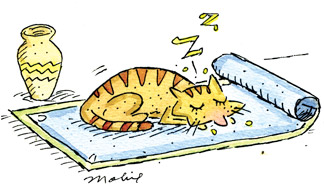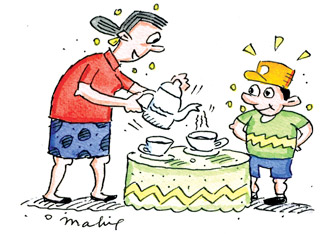|

By R.S. Karunaratne |
Subject and predicate
The division of a sentence into the subject and predicate is not
arbitrary. In fact, the subject of a sentence has a close relation to
what is being discussed.
The predicate shows that something new is being said about the
subject.In other words, the subject tells us what the sentence is about.
The predicate is the part of the sentence that gives information about
the subject.
 |
|
The cat sleeps on
the mat. |
Dogs (subject) bark. (predicate)
Sri Jayewardenepura (subject) is the capital of Sri Lanka.(predicate)
My friend (subject) visits his parents during the New Year
holidays.(predicate)
The subject usually comes before the predicate.
Nalin (subject) is a handsome youth. (predicate)
The predicate may contain an object, a complement or an adverbial.
The cow (subject) gives (verb) us milk. (object)
The principal (subject) is (verb) a graduate. (complement)
The adverbial usually appears at the end of the sentence.
The cat (subject) sleeps (verb) on the mat. (adverbial)
We (subject) drink (verb) water (object) every day. (adverbial)
Note: The object can be a person or thing that the subject does
something to.
 |
|
The cow gives us
milk. |
A complement describes a quality of the subject or object.
An adverbial tells us more about an action, event or state. It may
answer the question: When ? Where? or How?
In imperative sentences the subject is left out.
Sit down. (The subject ‘you’ is understood.)
Don’t go. (The subject ‘you’ is understood)
Activity
Underline the subject of the following sentences. Check your answers
with the key.
1. Sandra carefully searched the cupboard.
2. Maria is now a student at the Law College.
3. My brother is recovering gradually.
4. The teacher gave the students a lesson on punctuality.
5. They made him the chairman of the committee every year.
Key
1. Sandra
2. Maria
3. My brother
4. The teacher
5. They
Know the roots of English words
Part 2
The root of a word is the part of it common to all allied
words.Modern English words have grown from English, Latin and Greek
roots.
It is interesting and useful to know them. Here is a short list of
common Latin roots and modern English wordsderived from them.
Caput, capitis (head) cap, capital, captain
cedo, cessum (I yield) cede, concede, succeed
civis (citizen) city, civic, civilian, civilisation
claudo, clausum (I shut) clause, close, conclude, seclude
colo, cultum (I till) agriculture, cultivate, culture
corpus, corporis (body) corporation, corps, corpse
credo, creditum (I believe) credentials, credible,
credit, creed
culpa (fault) culpable, culprit, exculpate
curro, cursum (I run) course, current, excursion, occur
dens, dentis (tooth) dental, dentist, indent, trident
dominis (lord) dominate, domineer, predominant
duco, ductum (I lead) conduct, ductile, educate,
introduce
erro, erratum (I wander) errant, erratic,
erroneous, error
facio, factum (I do) fact, factory, feat, manufacture
finio, finitum (I finish) affinity, confine, definite, finite,
infinite
flecto, flectum (I bend) deflect, flexible, inflexion, reflect
fortis (strong) comfort, force, fortify, fortress
grex, gregis (flock) aggregate, congregate, gregarious,
segregate
jacio, jactum (I throw) object, inject, objection, reject,
subject
jungo, junctum (I join) conjunction, joint,
junction, juncture
jus, juris (law) jurisdiction, justice, justify
lego, lectum (I gather, read) collect, college, lecture,
legend, legible
linquo, lictum (I leave) delinquent, derelict, relic
relinquish
ludo, lusum (I play) collusion, interlude, ludicrous,
preclude
magnus (great) magnanimous, magnanimity,
magnitude
manus (hand) manual, manufacture, manuscript
medius (middle) immediate, mediate, medium
mergo, mersum (I plunge) emerge, emergency,
immerse, submerge
mitto, missum (I send) commission, missile,
mission, remit
moveo, motum (I move) commotion, emotion,
motion, motive, motor, movement
nomen, nominis (name) ignominy, nominal, nominate
numerus (number) enumerate, innumerable, numerous
opus, operis (work) cooperate, opera, operation,
operative To be continued
Starters
Past perfect tense
The past perfect tense is formed with 'had' and the past participle
of the verb.
Affirmative
 |
|
I had just poured a
cup of coffee when the doorbell rang. |
I had worked (First person singular)
You had worked (Second person singular)
He had worked (Third person singular)
We had worked (First person plural)
You had worked (Second person plural)
They had worked (Third person plural)
Negative
I had not worked.
You had not worked.
He had not worked.
We had not wored.
You had not worked.
They had not worked.
Interrogative
Had I worked?
Had you worked?
Had he worked?
Had we worked?
Had you worked?
Had they worked?
Negative interrogative
Had I not worked?
Had you not worked?
Had he not worked?
Had we not worked?
Had you not worked?
Had they not worked?
Negative interrogative contracted
Hadn't I worked?
Hadn't you worked?
Hadn't he worked?
Hadn't we worked?
Hadn't you worked?
Hadn't they worked?
The past perfect tense is the past equivalent of the present perfect
tense.
When I came home mother had left.
He had lost his purse and had to borrow money from me.
The past perfect tense can be used with 'since', 'for', and 'always'.
Anura had been a clerk since he was twenty.
Susila had waited at the bus halt for half an hour when her sister
turned up.
Saman had always been an athlete until he fell ill.
The past perfect tense is used when the subject looks back on an
earlier action.
My father had advised me not to seek employment until I was 22.
I had just poured a cup of coffee when the doorbell rang.
We use the past perfect tense for the first action which led to the
second action.
We usually use 'when' for this purpose.
When the soldier had opened fire, the terrorist ran for cover.
When he had finished the painting he sat down.
When I had seen all the exhibits I left the hall.
We use the past perfect tense to emphasis the completion of an
action. The beggar refused to leave till he had received a donation.
He did not rise from his seat till we had finished eating.
Before we had reached the cinema, the show started. |

